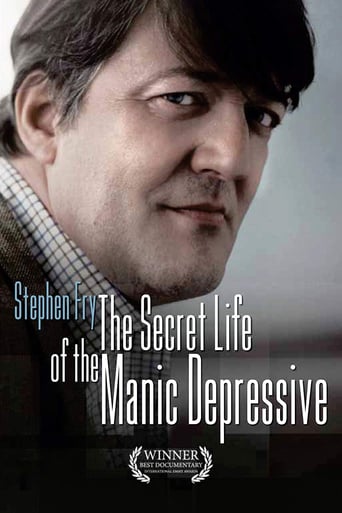



Fantastic!
A different way of telling a story
There are moments that feel comical, some horrific, and some downright inspiring but the tonal shifts hardly matter as the end results come to a film that's perfect for this time.
View MoreLet me be very fair here, this is not the best movie in my opinion. But, this movie is fun, it has purpose and is very enjoyable to watch.
View MoreStephen Fry the celebrated Englishman is a manic depressive and it takes a lot of courage to come out publicly let alone come out to the wide world in a documentary but this is a great effort by the comedian and he charts not just his battle with this disorder but its widespread effects and the ways one can try to work around it. Many are still confused as to what depression is and how devastating it can be- This is the documentary to show them.
View More'Stephen Fry: The Secret Life of a Manic Depressive', is an excellent explanation of manic depression in terms of providing a greater understanding of the mental illness for those who are perhaps unaware of its effects. The introduction has a powerful impact on the viewer: a step by step recreation of Fry's suicide attempt creates a depth of awareness about the illness' extremes. The documentary is informative, providing facts that include symptoms such as hallucinations and shortness of temper, as well as the fact that women suffering from manic depression become more at risk in pregnancy and childbirth. Fry speaks to a variety of people, whether it be someone in the same industry as him or someone from a different background. These diverse sources help to define what it is to be manic depressive, and also what it is like to experience its effects from a family member's perspective. The documentary explores the notion that often the illness is passed off as 'bad behaviour', and consequently as an audience we become more aware of our behaviour and understanding towards other people. Conflicting ideas such as the contrasting opinions of British and American psychiatrists about whether or not to diagnose the illness at an early age, allows the audience to think for themselves. The programme, while informative, does not provide all of the answers. This is important in consideration of the vastness of the topic and relates to the fact that there are still only limited methods with which we can detect manic depression. The coinciding camera close- up of the modern technology involved in scientific research, and the doctor's description of our lack of ability to detect the illness through brain scans and gene tests, is particularly effective. It encompasses the notion that in a modern society, research is a work in progress and to develop this progress, it is important for the world's human population to have an awareness of its strengths as well as its limitations.
View MoreIn 1995, Stephen Fry was performing in Simon Gray's West End play, "Cell Mates." After three days, he walked out of the production. Sitting in a garage, his hand on the car ignition, he contemplated suicide for two hours, before fleeing his home country for the European mainland. It wasn't until this frightening episode that Fry was diagnosed with manic depression, or bipolar disorder, a psychological condition that sees its sufferers oscillating dangerously between dizzying heights of mania and gutting troughs of prolonged depression.'Stephen Fry: The Secret Life of the Manic Depressive (2006),' a two- part documentary directed by Ross Wilson, unfolds like a personal journey of self-discovery. Fry confronts his medical condition by consulting experts and others who have suffered the disorder (including Richard Dreyfuss and Carrie Fisher). It's very bold for Fry, and indeed all these people, to take the viewer so closely into his personal struggles, and such frankness would, I imagine, be invaluable for anybody saddled with manic depression, whether it's been diagnosed or not.Throughout the documentary, Fry does seem quite insistent on stamping manic depression as a physiological disorder, encouraging the use of medication to control the condition (though Fry himself ultimately decides against any medication). Oddly, I don't recall much mention of therapy as an effective management technique, even though it must play a considerable role in the road to recovery. This is a valuable documentary, and, having been acquainted only with Stephen Fry's bubbly TV persona, a fascinatingly intimate character study.
View MoreSlightly unfocused and meandering, but nonetheless very illuminating and interesting documentary on bipolar disorder, hosted with an understandably personal touch by Stephen Fry whose at his most tactful without reserving his wittiness.Some more scientific interviews would've been welcome, but the range of opinions on manic depression draw an adequate picture of that particularly complex illness.Not quite as touching as it's meant to be, but still worth two hours of your time.7 out of 10 Electro Boys
View More